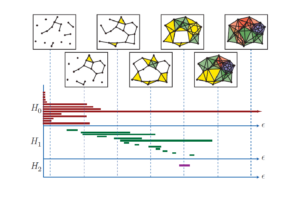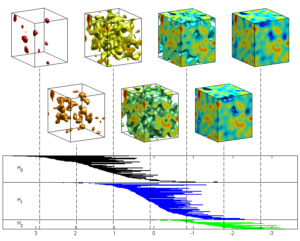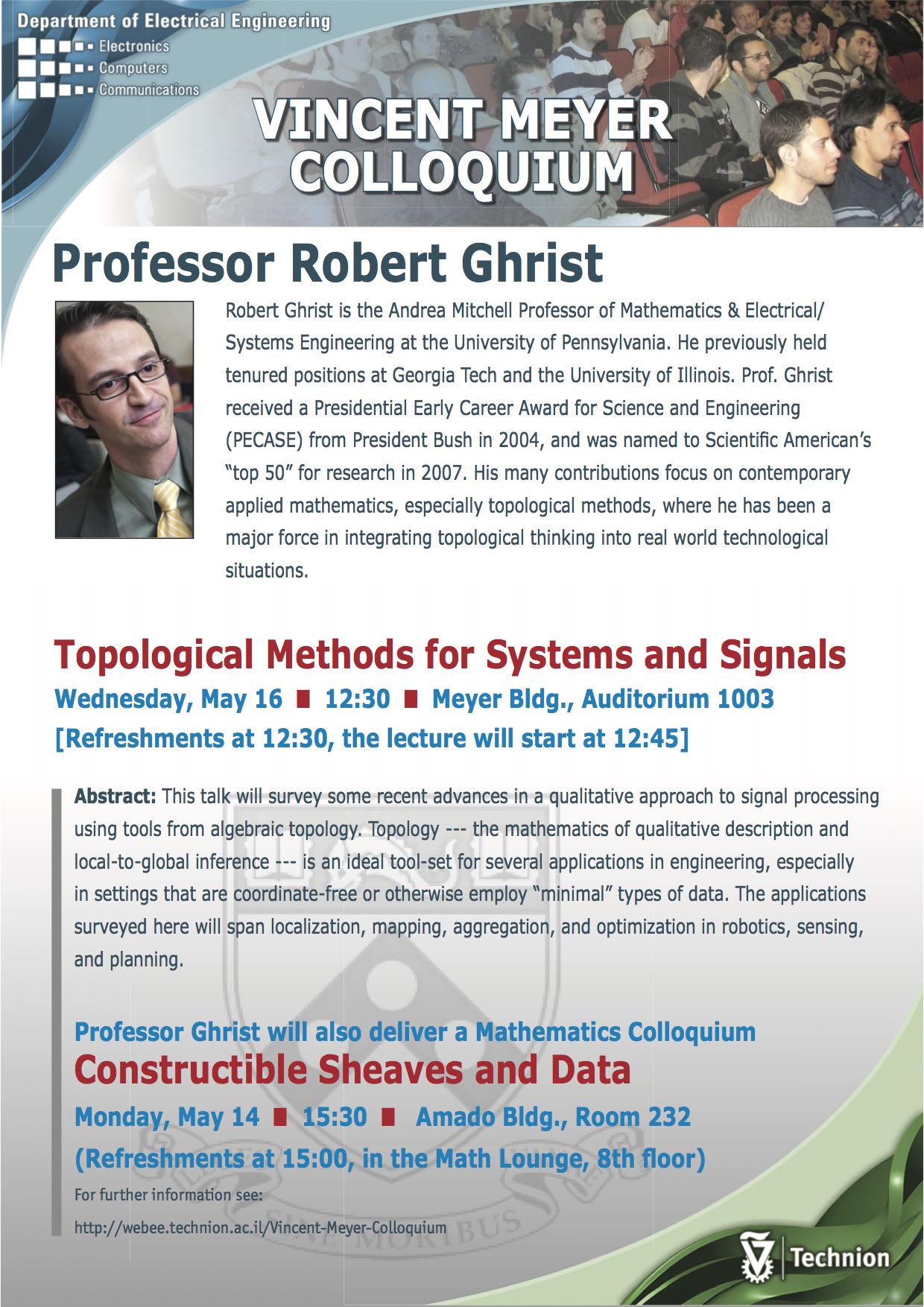048979: Selected Topics in Probability and Stochastic Processes: Winter, 2016/17.
- Instructor: Robert J. Adler
- Time: Tuesdays, 14:30-16:30.

- Place: Meyer (EE) Building, Room 353
- Content: This course is intended to be as much motivational as educational, and is intended to introduce engineers and data analysts to the powerful tools of topology, one of the oldest and yet most active areas of mathematics. It will also serve to educate interested mathematicians in the usefulness of their subject.

As technology progresses systems become larger and larger and are built from more and more components. Similarly, and not for unrelated reasons, data bases of all kinds have exploded. Predicting the behaviour of the complete system, or understanding the overall data structure, is often hard to do based simply on knowledge of the components. For over a hundred years topologists have been working of the similar problem of going from local combinatorial data to global information, and have been remarkably successful. In recent years these two areas have begun to interact and it is the aim of this course to describe the basic theory along with some of the applications of this interaction.
The course will aim for breadth rather than depth (see the ambitious list of topics below) but each student will need to develop depth in at least one topic for an end of semester project/presentation which is expected to include both some theory and an application.
- Some useful sites: Here are some places to find background information on applied topology in a number of settings.
- This site, which belongs to the Institute of Mathematics and its Applications, has a whole lot of expository lectures on applied topology, including theory, applications, and algorithms. When you get around to preparing a presentation for the final grade, you might want to look here and see if one of the experts has some tips on how to present things.
- This blog belongs to AYASDI, a Silicon Valley startup (with > 200 employees) using topological methods for Big Data. Lots of interesting stuff, but often seen through the rosy eyes of investors and salesman.
- Sayan Mukherjee has a set of lectures from a NSF-CBMS Conference on Topological Data Analysis that cover lots of topics. They are not well indexed (yet) but there is a lot of useful material there. I will probably steal some of this during the semester.
- MOST IMPORTANT OF ALL, is EAT, or Elementary Algebraic Topology, a most unusual book by the most unusual (and gifted) applied mathematic
 ian Robert Ghrist. I will be heavily relying on material from this book for the first part of the course. You can download chapters, or buy the entire (self-published) book, cheaply, at Amazon. There is even an EAT t-shirt. Ghrist gave a Vincent Meyer Colloquium in our Faculty in 2012.
ian Robert Ghrist. I will be heavily relying on material from this book for the first part of the course. You can download chapters, or buy the entire (self-published) book, cheaply, at Amazon. There is even an EAT t-shirt. Ghrist gave a Vincent Meyer Colloquium in our Faculty in 2012.
- General reference material: The material will come from a variety of sources, including
- Zomorodian, Topology for Computing
- Ghrist Elementary Applied Topology
- Zomorodian (ed), Advances in Applied and Computational Topology
- Carlsson, Topological Pattern Recognition for Point Cloud Data
- Farber, Invitation to Topological Robotics
- Adler, Taylor and Worsley, Applications of Random Fields and Geometry: Foundations and Case Studies
- And the granddaddy of all books on algebraic topology, by Allen Hatcher, with the simple name Algebraic Topology.
- Grade: The final grade will (probably) depend on a combination of homework and presentations given by students towards the end of the semester.
- Prerequisites: Undergraduate algebra, ordinary differential equations and a little dynamical systems, and a basic knowledge of stochastic processes and probability. No knowledge of topology will be assumed. Mainly, however, you will need patience to learn some new things and enthusiasm to piece a lot of quite different topics together.
LECTURE NOTES, ETC
- Lecture 1, Part 1, Powerpoint:
- Lecture 1, Part 2, Powerpoint:
- Lecture 1, Part 1, pdf file;
- Lecture 1, Part 2, pdf file
- Knots
- December20-s
- Percolation and stochastic topology
- Central limit theorems for simplicial complexes
REFERENCES FOR PROJECTS/PRESENTATIONS
Once the semester starts, and I see how many (if any) students there are, and we decide on precisely how/when the grades/projects/presentations will occur, I will post a list of projects/papers/etceteras here.
COURSE OUTLINE
The following outline is not cast in stone: I will almost definitely change it depending on who takes the course and what we turn out to be interested in, but it should give you an idea of to where we shall be heading.
| 1 | What is topology? What can it offer to engineering and data analysis? |
| 3-4 | Combinatorial topology, simplicial complexes. Homology and the algebraic description of shape. Persistent homology and bar codes. |
| 5-6 | Applications to `Big Data’: Dimension reduction and manifold learning from a topological viewpoint. Efficiency and sample size issues. |
| 7 | Manifolds and differential topology. Morse theory. |
| 8 | Configuration spaces for robot arms, topology of random linkages, navigational complexity of configuration spaces. |
| 9 | Euler characteristic. Euler integration, and network coverage, sensor networks. |
| 10 | Random functions. Level crossings. fMRI and statistical image analysis. Euler characteristics and random functions. |
| 11 | Random geometric complexes, topological phase transitions. |
| 12-13 | Student presentations (which may also overlap with some of the earlier weeks and topics). |